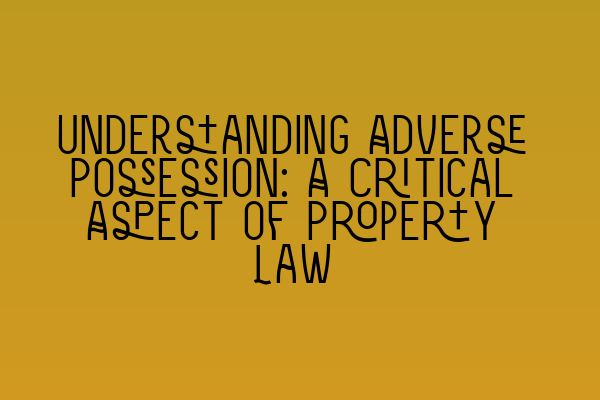Understanding Adverse Possession: A Critical Aspect of Property Law
In the world of property law, there are many complex concepts and legal principles that govern the ownership and possession of land. One such concept that often sparks intrigue and debate is adverse possession. Adverse possession refers to a legal doctrine that allows an individual to gain legal ownership of someone else’s property by occupying it without the owner’s consent for a certain period of time. This aspect of property law has the potential to significantly impact landowners and those seeking to establish their ownership rights. In this blog post, we will delve into the intricacies of adverse possession, examining its rationale, requirements, and implications.
The Rationale Behind Adverse Possession
Adverse possession has a long historical basis, rooted in the idea that unused or neglected land should not go to waste. By allowing a person who possesses land openly and exclusively for an extended period of time to acquire legal ownership, adverse possession encourages the productive use of land. It incentivizes individuals to take care of abandoned or overlooked properties, leading to the efficient allocation and utilization of land resources within society.
The Requirements for Adverse Possession
For adverse possession to be successful, certain criteria must be met. These requirements typically include:
- Actual and exclusive possession: The occupier must have physical control over the property and exclude others from using it. Mere presence or intermittent use is generally insufficient to satisfy this requirement.
- Open and notorious possession: The occupier’s possession must be visible and obvious to anyone who investigates the property. They should not attempt to hide or conceal their occupation.
- Hostile possession: The occupation must be hostile to the rights of the true owner. It means that the occupier is not there with the owner’s permission or under any legal right.
- Continuous possession: The occupation must be uninterrupted and continuous for the statutory period, which varies by jurisdiction. Any gaps in possession could invalidate an adverse possession claim.
- Exclusive possession: The occupier must have exclusive possession of the property, meaning they have sole control and use of the land to the exclusion of others, including the true owner.
- Time period: Each jurisdiction has its own time frame for adverse possession, which typically ranges from 10 to 30 years. The length of possession required varies based on the specific legal system.
Meeting these requirements can be challenging, and the burden of proof lies on the party seeking to establish adverse possession.
The Implications of Adverse Possession
The effects of a successful adverse possession claim can be far-reaching. If an individual meets the necessary elements, they can legally become the owner of the property they have been occupying. This transfer of ownership can have significant implications for the original landowner, who may suddenly find themselves stripped of their property rights.
Adverse possession can disrupt the stability and security of property ownership. It serves as a reminder to landowners of the importance of monitoring and maintaining their property, as neglect or oversight can be the gateway for someone else to claim ownership. However, it also serves as a safeguard against unresolved or dormant property disputes, providing a mechanism for resolving ownership uncertainties.
The Complexities of Adverse Possession
Adverse possession is a complex area of property law, with legal intricacies that can vary across jurisdictions. It requires a thorough understanding of the specific requirements and timeframes mandated by the legal system in question. If you find yourself involved in an adverse possession dispute, seeking legal advice from experienced property law solicitors is crucial.
At SQE Property Law & Land Law, our team of skilled solicitors specializes in property law matters, including adverse possession cases. With our in-depth knowledge and expertise, we can guide you through the intricate legal process, helping you navigate the complexities and protect your rights as a landowner. Contact us today to schedule a consultation.
Continuing Your SQE Preparation
Understanding the intricacies of property law, such as adverse possession, is essential for those pursuing a career in law. To ensure you are fully prepared for the SQE exams, it is vital to invest in comprehensive SQE 1 and SQE 2 preparation courses. These courses provide the necessary knowledge and skills to excel in the exams and demonstrate your competency as a solicitor.
Check out our related articles below for further information on SQE exam preparation and practice resources:
- SQE 1 Practice Exam Questions
- SQE 1 Practice Mocks FLK1 FLK2
- SQE 2 Preparation Courses
- SQE 1 Preparation Courses
- SRA SQE Exam Dates
Invest in your future as a solicitor by enrolling in our SQE preparation courses today!
